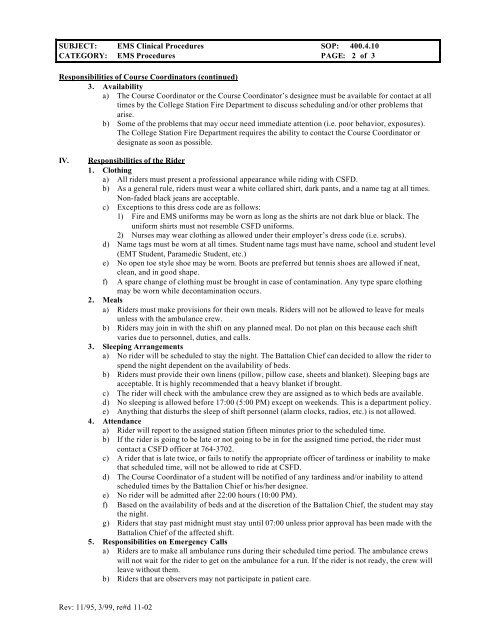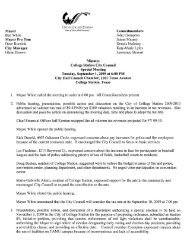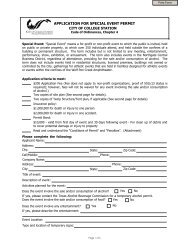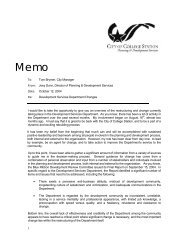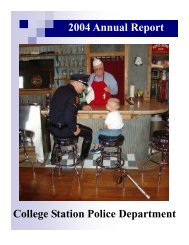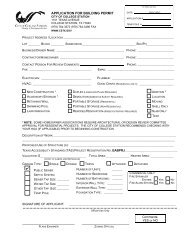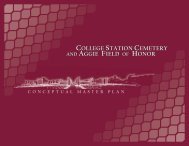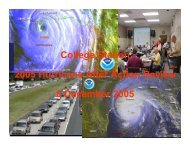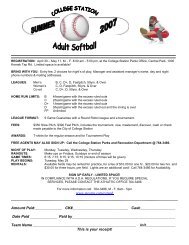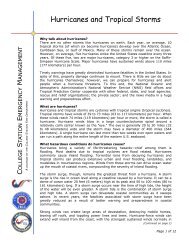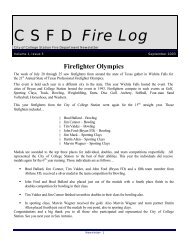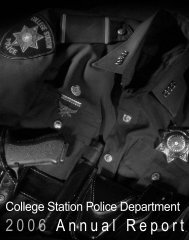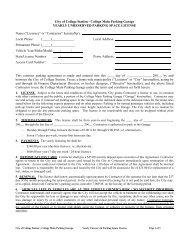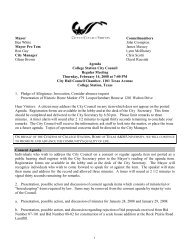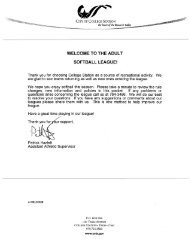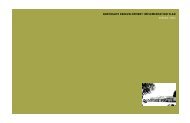standard operating procedure college station fire department
standard operating procedure college station fire department
standard operating procedure college station fire department
You also want an ePaper? Increase the reach of your titles
YUMPU automatically turns print PDFs into web optimized ePapers that Google loves.
SUBJECT: EMS Clinical Procedures SOP: 400.4.10<br />
CATEGORY: EMS Procedures PAGE: 2 of 3<br />
Responsibilities of Course Coordinators (continued)<br />
3. Availability<br />
a) The Course Coordinator or the Course Coordinator’s designee must be available for contact at all<br />
times by the College Station Fire Department to discuss scheduling and/or other problems that<br />
arise.<br />
b) Some of the problems that may occur need immediate attention (i.e. poor behavior, exposures).<br />
The College Station Fire Department requires the ability to contact the Course Coordinator or<br />
designate as soon as possible.<br />
IV.<br />
Responsibilities of the Rider<br />
1. Clothing<br />
a) All riders must present a professional appearance while riding with CSFD.<br />
b) As a general rule, riders must wear a white collared shirt, dark pants, and a name tag at all times.<br />
Non-faded black jeans are acceptable.<br />
c) Exceptions to this dress code are as follows:<br />
1) Fire and EMS uniforms may be worn as long as the shirts are not dark blue or black. The<br />
uniform shirts must not resemble CSFD uniforms.<br />
2) Nurses may wear clothing as allowed under their employer’s dress code (i.e. scrubs).<br />
d) Name tags must be worn at all times. Student name tags must have name, school and student level<br />
(EMT Student, Paramedic Student, etc.)<br />
e) No open toe style shoe may be worn. Boots are preferred but tennis shoes are allowed if neat,<br />
clean, and in good shape.<br />
f) A spare change of clothing must be brought in case of contamination. Any type spare clothing<br />
may be worn while decontamination occurs.<br />
2. Meals<br />
a) Riders must make provisions for their own meals. Riders will not be allowed to leave for meals<br />
unless with the ambulance crew.<br />
b) Riders may join in with the shift on any planned meal. Do not plan on this because each shift<br />
varies due to personnel, duties, and calls.<br />
3. Sleeping Arrangements<br />
a) No rider will be scheduled to stay the night. The Battalion Chief can decided to allow the rider to<br />
spend the night dependent on the availability of beds.<br />
b) Riders must provide their own linens (pillow, pillow case, sheets and blanket). Sleeping bags are<br />
acceptable. It is highly recommended that a heavy blanket if brought.<br />
c) The rider will check with the ambulance crew they are assigned as to which beds are available.<br />
d) No sleeping is allowed before 17:00 (5:00 PM) except on weekends. This is a <strong>department</strong> policy.<br />
e) Anything that disturbs the sleep of shift personnel (alarm clocks, radios, etc.) is not allowed.<br />
4. Attendance<br />
a) Rider will report to the assigned <strong>station</strong> fifteen minutes prior to the scheduled time.<br />
b) If the rider is going to be late or not going to be in for the assigned time period, the rider must<br />
contact a CSFD officer at 764-3702.<br />
c) A rider that is late twice, or fails to notify the appropriate officer of tardiness or inability to make<br />
that scheduled time, will not be allowed to ride at CSFD.<br />
d) The Course Coordinator of a student will be notified of any tardiness and/or inability to attend<br />
scheduled times by the Battalion Chief or his/her designee.<br />
e) No rider will be admitted after 22:00 hours (10:00 PM).<br />
f) Based on the availability of beds and at the discretion of the Battalion Chief, the student may stay<br />
the night.<br />
g) Riders that stay past midnight must stay until 07:00 unless prior approval has been made with the<br />
Battalion Chief of the affected shift.<br />
5. Responsibilities on Emergency Calls<br />
a) Riders are to make all ambulance runs during their scheduled time period. The ambulance crews<br />
will not wait for the rider to get on the ambulance for a run. If the rider is not ready, the crew will<br />
leave without them.<br />
b) Riders that are observers may not participate in patient care.<br />
Rev: 11/95, 3/99, re#d 11-02


